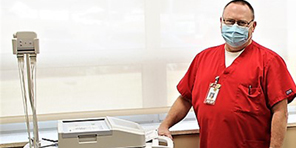CHESTER — Growth and development has continued at Memorial Hospital throughout 2021. Even through the challenges of the pandemic, our staff have worked diligently with contractors and design teams to ensure nothing stops us from “building for your future” and a healthier tomorrow. The corridor on the West Wing (old medical surgical unit) is NOW OPEN!
The newly remodeled space, now houses the Pharmacy, Cardiopulmonary Department, and Nuclear Medicine. Moving two of these departments from basement locations to main floor access for patients is just one of the ways we are improving our model of care. Each new unit provides additional space for services, a bright inviting atmosphere, improved workflows for staff, and a new waiting room.
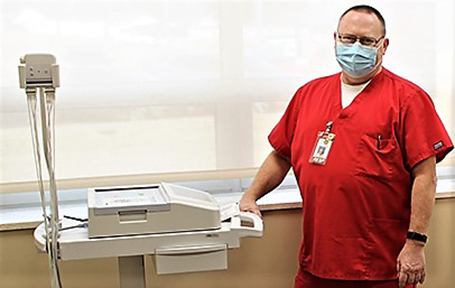
Kenneth Stout, Respiratory Therapist
To access the new cardiopulmonary unit, patients will no longer have to walk to the opposite side of the basement. All services have been moved closer to the entrance for patient convenience. Less stress on our patients means better treatment and care.
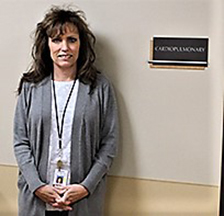
Georgia Stipe, Director of Cardiopulmonary
These two things always remain top priority, how can we better treat and care for our community?
Georgia Allen, Director of Cardiopulmonary also points out, that, “the new location offers staff quicker access to our Medical-Surgical floor and ER, making care for the patients quicker.” Quick response times are essential when a patient is struggling to breath or is having a cardiac event. Having the ease of rolling vital equipment just a few steps during an urgent event, streamlines their access to the patient in need.
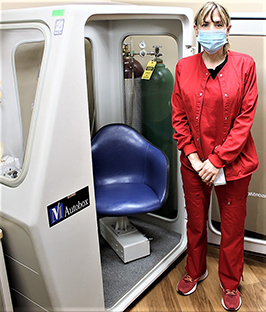
Janine Leclere, Respiratory Therapist
Nuclear Medicine remains located within the Cardiopulmonary Department but, also has its new location on the main level, bringing it closer to the Diagnostic Imaging department as a whole. Nuclear Medicine looks at the physiology of the body rather than the anatomy. Services of Memorial’s Nuclear Medicine Department include, but are not limited to, cardiac studies, bone studies, gall bladder studies and infection studies.
Nuclear medicine procedures can be used to diagnose hyperthyroidism (Grave’s Disease), cardiac stress, orthopedic problems, abnormal function or blockages of gall bladder or liver, as well as for metabolic brain evaluations, and the staging of oncology patients.

From left are Chris Barthol, Pharmacy Tech.; Kathy Winkler, Pharmacist and Director of Pharmacy; Jennifer Colvis, Pharmacy Tech.; Amy Kloos, Pharmacist
At the far end of the hallway, visitors and patients will find the pharmacy. The pharmacy has always been an active part of hospital providing vital medication for in-patients, chemotherapy and infusion patients, drugs for operations, and various other procedures at the hospital. With their new location, the Memorial Community Pharmacy is excited to add a few other additional services to their line of care, one of which includes Meds-to-Beds program. This new service provides a convenience to patients at Memorial.
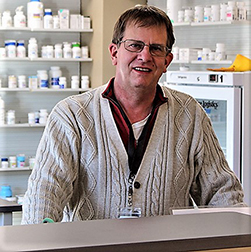
Jerre Atchison, Pharmacist
“Prescriptions written at the hospital can be filled during our hours,” explains Kathy Winkler, Pharmacist and Director of Pharmacy, “this way, patients don’t have to make additional stops.” While the patient is awaiting discharge, their medications can be filled, so when it is time to go home, they can do just that…go home…no additional stops along the way.
Meds-to-Beds provides a convenient service to both the patient and the family unit. The patient is able to travel uninterrupted to their home to continue the healing process in a familiar environment. Medications can be delivered bedside by staff, they can stop by the pharmacy before they leave, or they can pull around curbside at the designated parking spots and have their medications brought to them before they head home.
At Memorial, our patients and the healthcare of our community are top priority. We are excited about the many renovations, advancements, and improvements to patient and employee workflow we have completed and look forward to sharing with you the many more to come.

